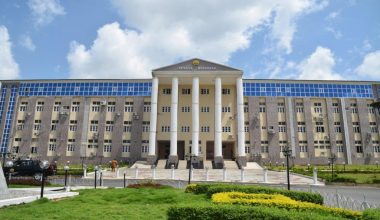Open universities have become increasingly popular around the world, bridging the academic gap and educating people in so more ways than traditional higher institutions.
Nigeria isn’t left out as it has a fully functional open university and in this article, we will be discussing the NOUN courses.
As a student of an Open University, you do not have to worry about distance or your location as your lectures and exams can all take place online.
You also need not worry about the stress of combining school or other obligations with work because you can study and progress academically at your own pace.
The fees paid in open universities are usually not as much as what you might pay in a traditional university and yet the certificates obtained from an open university are accepted in all parts of the world.
Our article will explore all there is to know about the National Open University of Nigeria – NOUn and its courses.
We will also look at the cost of studying in an open university and so much more.
Table of contents
- What is NOUN
- What Is An Open University?
- Benefits of Studying At an Open University
- 6. No Time Limit
- 7. Degree Cost Is More Financially Manageable
- 8. Student Discounts
- NOUN Course, Admission, and Requirements for All Programmes.
- Other Requirements
- Postgraduate Diploma Programme s
- Master Degree Programmes
- Doctor of Philosophy (PH.D) P rogrammes
- Access Programme
- How to Apply for the NOUN Admission Form
- How much is NOUN from 2024?
- How many years does it take to study at NOUN University?
- Can I use a NOUN certificate abroad?
- List of NOUN Courses and Programs
- NOUN courses and fees: How much is the NOUN fee payment?
- Noun Courses: Frequently Asked Questions
- Conclusion
- References
- Read Also
What is NOUN
The National Open University of Nigeria is a federal open and remote learning institution in Nigeria, often known by its acronym, NOUN. With more than 500,000 students enrolled, NOUN is the biggest university in Nigeria in terms of enrollment.
The college was established to give both foreign and Nigerian students an affordable, easily accessible, and adaptable education.
The university provides a wide range of postgraduate courses, degrees, and diplomas. These are the different NOUN courses for undergraduate and postgraduate studies available that one can enroll in.
Read Also: List Of Courses Under Science In Nigeria Universities And Their Cut-off Mark | 2024
What Is An Open University?
If you’re just starting your research on choosing an online degree program, you’ve probably come across the term “open university.”
An open university offers degree programs with low or no admission requirements. Their mission is to offer “education for all.”
Choosing the right science course can be a lot, especially when considering your future career and personal interests. Read 20+ Best Science Courses to Study in Nigeria to know more.
Benefits of Studying At an Open University
There are numerous reasons why students should be encouraged to study in an open university, and in our article we will take a look at a few of them below:
1. Low Or No Entry Requirements
One of the main advantages of open universities is that they have low or no entry requirements. This is also known as open admission.
So what do low or no entry requirements look like exactly?
- You’re a mature student, which means it’s been an extended period since you’ve had any formal education (including high school). For many universities, this means 4 years or more.
- Your high school grades aren’t good enough to qualify for admission to a degree program at a traditional university.
- There is usually no formal test, but open universities assume you have a solid grasp of the English language (or whatever the main language of the country the institution is in).
- They assume you have basic computer skills, as open university is taught 100% online.
- You can attend at any age.
Although the above list can vary from school to school, these are what constitute low or no entry requirements at open universities. Always confirm the requirements for each open university you’re considering, as well as the requirements for their specific degree programs.
2. Accredited
Most open institutions have official approval from an independent third entity, which is known as accreditation. Not excluded is the Nigeria Open University.
The thing that makes your degree “real” is accreditation. An open university’s accreditation can be verified by visiting its “About Us” page.
These organizations take great care in their accreditation, therefore you should locate the solution as soon as possible. Be cautious if you are unable to determine whether the university is accredited or who the accrediting agency is.
Read Also: Top 20+ Microbiology Courses in Nigeria | 2024
3. Instruction By Qualified Teachers
A university’s professors are no less qualified than those at a regular institution just because it offers open admission.
Qualified instructors who work at open universities will guide you through the course material. Instructors are available to answer questions, offer comments on assignments, and mark quizzes and exams, even though the majority of open universities operate on an independent study model, where students complete the course material at their speed without weekly online lectures.
You most likely won’t finish your degree without at least one awful online professor, just like in any other kind of school, whether it be traditional or otherwise. It occurs to everyone!
Getting into Nigerian universities, especially top ones like UNILAG, is very competitive. Find out all you need to know about Unilag and the courses it offers.
4. 100% Online
Every open university uses a course portal, like Moodle or Blackboard, to provide learning activities online. This lets you study from any location, be it your kitchen table, a vacation spot, or somewhere else on the globe.
Textbooks and other tangible items are mailed to your address. You can usually find the online edition of a book if you don’t want the physical version.
I promise you won’t want to be hauling around a 4.5-pound textbook in your carry-on—I know I have, and it’s not fun.
Additionally, all correspondence with professors takes place online via email or the course platform’s messaging system.
If you would want to speak with an actual person for clarification, instructors do have a phone number.
5. Independent Study
As was already established, individual study is the norm at most open colleges. You study alone, going at your own pace via the pre-arranged content.
You can view the course content whenever you like; there are no weekly online lectures to attend at a specific time. Many open colleges give you a time limit to complete the course, but there aren’t formal due dates for tests or assignments.
For instance, a Thompson Rivers University online learning course has a 30-week (or 7.5-month) completion period.
For students who have other obligations to attend to and are unable to attend a weekly in-person session for an extended period, independent study is an excellent option.
However, some open universities such as The Open University in the United Kingdom do have official deadlines for assignments and exams within each course. If you need more structure, consider one of their degree programs – you can attend The Open University from anywhere in the world.
6. No Time Limit
An open university degree can be finished in as little as three years or as much as ten years, in contrast to traditional institutions that have a defined time to accomplish a degree (usually four years in Canada or the United States).
For students who wish to study full-time to finish their degree more quickly, it’s ideal. Alternatively, you might study part-time for as long as it takes you if you don’t have much time. The main drawback to taking your time is that, if you’re enrolled in a degree program, you usually have to finish a course once every year or two.
Read Also: University of Abuja Courses, Fees and Requirements | 2024
7. Degree Cost Is More Financially Manageable
In general, an open university is less expensive than a regular institution. This simply indicates that the total cost of your degree will be less than at a typical institution because you won’t have to pay for on-campus housing and meals or tuition and other fees. It doesn’t imply that tuition and other fees are necessarily less expensive.
The fact that admission is available all year round and tuition is paid on a course-by-course basis helps to make the open university more affordable. This implies that you won’t have to pay for your entire course load at once. It enables you to, if necessary, fit your studies onto a tight budget.
Open university is more financially manageable for two reasons:
- You pay course by course.
- No commute costs and no on-campus food or accommodation costs.
8. Student Discounts
You are still eligible for student discounts even if you are enrolled in an open institution and complete all of your coursework online!
Find out how to apply for and receive a student card via mail. Make the most of this occasion because it won’t come around very often!
Choosing a course of study is a big decision. You want to find something that challenges you, but not something that’ll drive you crazy! Check out how not to pick any hard courses here.
NOUN Course, Admission, and Requirements for All Programmes.
Undergraduate Programmes
1. Certification Programs
a) Certificate Programs for Proficiency
It is not required to have any prior experience or qualifications.
Reading and writing proficiency will be beneficial.
b) Academic Certificate Programs at Universities
- Certificate of Junior Secondary Education.
- A minimum of two credits must be earned in NECO, NABTEB, and the SSCE/GCE “O” Level at no more than two sittings.
- T.C. II in no more than two sittings with a minimum of two merits.
- Mature applicants (30 years of age and older) who have at least 10 years of relevant work experience under their belts, or who can demonstrate prior knowledge or skill in a related sector, may be given consideration based only on merit.
- Certificate of Standard Islamiyyah School (I’dadiyah).
2. Diploma Programmes
- Three credits minimum in NECO, NABTEB, and SSCE/GCE “O” Level at no more than two sittings, with a minimum English language pass certificate.
- A minimum of three merits in two sittings for the Teacher Grade II Certificate.
- The Standard Islamiyyah School’s Thanawiyyah Certificate, which includes Arabic and Islamic Studies, is equivalent to the Senior Islamic School Certificate or Higher Islamiyyah Certificate.
- Academic credentials from NOUN as well as credentials from other accredited schools.
Check Out: NDA Courses, Requirements for Admission and Fees | 2024
Programs for Undergraduates.
Level 100
- Five credits in topics related to the intended field(s) of study from the SSCE, GCE O’Level, NECO, NABTEB, or equivalents at no more than two(2) sittings.
- Teachers’ Grade II certifications: Obtain the equivalent of five credits at the ‘O’Level by combining this certificate with any of the certifications listed under (i) and earning at least five merits.
- Candidates for admission to the School of Law must have a minimum of a credit pass in mathematics at no more than two (2) sittings in the NECO, SSCE, or GCE O/L only.
- They must also have five (5) English language and literature credits.
- One of the five credits or merits, according to the School of Arts and Social Sciences, must be in the English language, and at least two (2) of the credits must be in topics related to the intended field.
- English and mathematics must be passed at the Ordinary Level to be admitted to the School of Management Sciences.
- English language for all humanities and mathematics for science education are required credit passes for the School of Education. Moreover, science education students need to obtain credit in the English language.
- English language and mathematics must be passed for the School of Science and Technology.
- Five (5) O’Level (SSCE, NECO, GCE, or NABTEB) Credits, at no more than two sittings, including English language and mathematics, as well as any of geography, physics, chemistry, biology, agricultural science, and economics, are the minimum entry requirements for the B.Sc.
- Environmental Science and Resource Management program.
200 Level
- Upper Credit National Diploma from Accredited Schools.
- National Certificate in Education (NCE) in a topic or subjects with at least one merit and two passes that are pertinent to the suggested study plan.
- Interim Joint Matriculation Board (IJMB) credit passes are required for International Baccalaureates, as well as at least two “A” Level papers in pertinent areas.
- A minimum of a Second Class (Lower) degree from an accredited university, along with at least five credits in English language, English literature, and mathematics at no more than two sittings in the NECO / SCCE or GCE “O” Level alone, are requirements for admission to the School of Law.
- Applicants may be admitted to the 300 Level of the program at the School of Science & Technology if they meet the following requirements: a) Five (5) credit passes in the following topics at the SSCE, NECO, GCE, or NABTEB in no more than two sittings: Economics and Geography in English.
b) A certified and licensed community health extension worker with at least two years of post-qualification experience and a Diploma in Community Health Officers Program (Higher National Diploma).
Other Requirements
- Five (5) “A” level and “0” level credit passes in subjects related to the suggested program (s) are required.
- All programs in science and technology, business education, and science education require a “O” level credit pass in mathematics.
- A math “O” level pass may be taken into consideration for social science programs. Additionally, mathematics and physics programs may consider an English language proficiency of the “O” level.
- Candidates must have passed English literature at the “O” level to be eligible to apply for the B.A. in English, B.A. (Ed) in English, and B.Sc. in mass communication programs.
- For advanced placement and waiver, holders of a first degree, HND, or RN who have appropriate prior knowledge and work experience may be given consideration.
- Candidates may still apply if they are awaiting the results of any pertinent exams, but they should be aware that their applications won’t be processed until all entry requirements have been satisfied.
Are you a prospective student looking to gain admission to the Federal University Oye-Ekiti (FUOYE) in Nigeria? Here’s a list of courses offered in FUOYE and their cut-off mark.
Postgraduate Diploma Programmes
Applicants must either hold a bachelor’s degree certificate or its equivalent from an institution that the NOUN Senate has recognized, or
- Holders of HND from an institution approved by the NOUN Senate with a minimum Lower Credit.
- Candidates must have at least an L.L.B. to be admitted to the School of Law.
- The minimum prerequisite for entrance to the PGD Agricultural Extension and Management program is a bachelor’s degree with a third-class division.
- Acceptance is contingent upon a passing degree and at least three years of relevant experience.
- Agric Science HND holders, as well as those in related fields, may be admitted.
- Admission is granted to holders of bachelor’s degrees in agricultural sciences, biological/earth sciences, and basic science from universities recognized by NOUN.
- Candidates must have an HND or a strong first degree in a related field of study to be considered for admission to the PGD HIV/AIDS Education and Management. five credits in addition to two other disciplines, mathematics, science, and English.
Master Degree Programmes
- A first degree in a comparable field or study with at least a Second Class Lower from a university recognized by the NOUN Senate.
- A postgraduate degree in a relevant subject from a university with Senate recognition may also be accepted.
- A strong honors degree in education with a focus on the humanities, sciences, social sciences, arts, and technology from any university accepted by the NOUN Senate.
Read Also: 20+ Useless Courses to Study in Nigeria | 2024
Doctor of Philosophy (PH.D) Programmes
Candidates must have a master’s degree in a relevant discipline from a university approved by the NOUN Senate and have a cumulative grade point average (CGPA) of 3.5 on a 5-point scale, or a minimum score average of at least 60%, to be considered for the doctor of philosophy degree programs.
Before an admissions offer is made, candidates for Ph.D. programs will be invited to an interactive session.
It is recommended that applicants send their transcripts of records and three (3) referee reports two of which must be from people who are quite familiar with the applicant’s academic work to the dean of the postgraduate school where admission is being sought.
Access Programme
- The National Open University of Nigeria currently provides the Nigerian Public with an “O” level remedial program as part of its mission to broaden access to higher education.
- If accepted into these programs, students will receive face-to-face instruction for the whole academic year before sitting for whatever National “O” Level exam they choose.
- The curriculum would initially begin in each of the university’s three study centers, Lagos, Kaduna, and Kebbi.
How to Apply for the NOUN Admission Form
All of the procedures are electronic and available online around the clock. The following is the application method:
- Check out the website the website www.nouonline.net
- Navigate to the Menu Bar on the Home Page and select Apply for Admission.
- Choose amongst the ACETEL Programs, Postgraduate Programs, PhD Programs, and Undergraduate Programs.
- Select “Choose Faculty” (notice that it is located on the left side of the screen).
- Choose Faculty Fill in the form that appears.
- To examine the admissions requirements, click the link below.
- Click “Apply” to continue.
- Notice the UNIQUE ID that is displayed.
- Press the “Continue” button.
- Choose Bank Branch as the method of payment.
- To make a payment, click “Pay” Copy and bring your RRR number to any bank office.
How much is NOUN from 2024?
- Undergraduate Programmes N5,000.00 (five thousand naira only)
- Postgraduate (PGD and Masters) Programmes N7, 500.00 (Seven thousand five hundred naira only).
- Doctor of Philosophy (Ph.D) Programmes N10,000.00 (Ten Thousand Naira only).
Check Out: University Of Ibadan (UI) JAMB cut-off mark for all courses | 2024
How many years does it take to study at NOUN University?
Depending on the course, completing a bachelor’s or master’s degree requires at least two to four years. For their course to be most valuable for their future job, a student pursuing higher education should make sure they are accepted into a reputed university.
Can I use a NOUN certificate abroad?
The NOUN offers degrees and certificates that are widely recognized both domestically and abroad in Nigeria.
List of NOUN Courses and Programs
| S/N | Programme |
| 1 | B.A. Arabic |
| 2 | B.A. Christian Theology |
| 3 | B.A. English |
| 4 | B.A. French |
| 5 | B.A. Hausa |
| 6 | B.A. Igbo |
| 7 | B.A. Islamic Studies |
| 8 | B.A. Philosophy |
| 9 | B.A. Yoruba |
| 10 | B.A.(ED) Early Childhood Education |
| 11 | B.A.(ED) English |
| 12 | B.A.(ED) French |
| 13 | B.A.(ED) Primary Education |
| 14 | B.Agric Agricultural Economics and Agro-Business |
| 15 | B.Agric Agricultural Extension and Rural Development |
| 16 | B.Agric Animal Science |
| 17 | B.Agric Crop Science |
| 18 | B.Agric Soil and Land Resources Management |
| 19 | B.LIS Library and Information Science |
| 20 | B.NSc. Nursing Science |
| 21 | B.Sc. Accounting |
| 22 | B.Sc. Banking and Finance |
| 23 | B.Sc. Biology |
| 24 | B.Sc. Broadcast Journalism |
| 25 | B.Sc. Business Administration |
| 26 | B.Sc. Chemistry |
| 27 | B.Sc. Computer Science |
| 28 | B.Sc. Cooperative and Rural Development |
| 29 | B.Sc. Criminology and Security Studies |
| 30 | B.Sc. Development Studies |
| 31 | B.Sc. Economics |
| 32 | B.Sc. Entrepreneurship |
| 33 | B.Sc. Environmental Health Science |
| 34 | B.Sc. Environmental Science and Resource Management |
| 35 | B.Sc. Film Production |
| 36 | B.Sc. Information Technology |
| 37 | B.Sc. International Relations |
| 38 | B.Sc. Marketing |
| 39 | B.Sc. Mass Communication |
| 40 | B.Sc. Mathematics |
| 41 | B.Sc. Maths and Computer Science |
| 42 | B.Sc. Peace Studies and Conflict Resolution |
| 43 | B.Sc. Physics |
| 44 | B.Sc. Political Science |
| 45 | B.Sc. Public Administration |
| 46 | B.Sc. Public Health |
| 47 | B.Sc. Tourism Studies |
| 48 | B.Sc.(ED) Agricultural Science |
| 49 | B.Sc.(ED) Biology |
| 50 | B.Sc.(ED) Business Education |
| 51 | B.Sc.(ED) Chemistry |
| 52 | B.Sc.(ED) Computer Science |
| 53 | B.Sc.(Ed) Health Education |
| 54 | B.Sc.(Ed) Human Kinetics |
| 55 | B.Sc.(ED) Integrated Science |
| 56 | B.Sc.(ED) Mathematics |
| 57 | B.Sc.(ED) Physics |
| 58 | LLM Law |
| 59 | M.A. Christian Religious Studies (African Traditional Religion) |
| 60 | M.A. Christian Religious Studies (Church History) |
| 61 | M.A. Christian Religious Studies (New Testament) |
| 62 | M.A. Christian Religious Studies (Old Testament) |
| 63 | M.A. Christian Religious Studies (Pastoral Theology) |
| 64 | M.A. Christian Religious Studies (Philosophy of Religion) |
| 65 | M.A. Christian Religious Studies (Religion and Society) |
| 66 | M.A. Christian Religious Studies (Systematic Theology) |
| 67 | M.A. English (Comparative Literature) |
| 68 | M.A. English (Language) |
| 69 | M.A. English (Literature In English) |
| 70 | M.A. Islamic Studies |
| 71 | M.ED. Administration and Planning |
| 72 | M.ED. Educational Technology |
| 73 | M.ED. Guidance and Counselling |
| 74 | M.ED. Science Education |
| 75 | M.Sc. Business Administration |
| 76 | M.Sc. Criminology and Security Studies |
| 77 | M.Sc. Entrepreneurship |
| 78 | M.Sc. Information Technology |
| 79 | M.Sc. Mass Communication |
| 80 | M.Sc. Peace Studies and Conflict Resolution |
| 81 | M.Sc. Public Administration |
| 82 | M.Sc. Public Health |
| 83 | Masters in Business Administration |
| 84 | Masters in Public Administration |
| 85 | PGD. Agricultural Extension Management |
| 86 | PGD. Business Administration |
| 87 | PGD. Christian Theology |
| 88 | PGD. Criminology and Security Studies |
| 89 | PGD. Economics |
| 90 | PGD. Education |
| 91 | PGD. Entrepreneurship |
| 92 | PGD. Information Technology |
| 93 | PGD. Legislative Drafting |
| 94 | PGD. Mass Communication |
| 95 | PGD. Peace Studies and Conflict Resolution |
| 96 | PGD. Public Administration |
| 97 | PhD Business Administration |
| 98 | PhD Christian Theology (African Christian Theology) |
| 99 | PhD Christian Theology (African Traditional Religion) |
| 100 | PhD Christian Theology (Church History) |
| 101 | PhD Christian Theology (New Testament) |
| 102 | PhD Christian Theology (Old Testament) |
| 103 | PhD Christian Theology (Pastoral Theology) |
| 104 | PhD Christian Theology (Philosophy of Religion) |
| 105 | PhD Christian Theology (Religion and Society) |
| 106 | PhD Christian Theology (Systematic Theology) |
| 107 | PhD Criminology and Security Studies |
| 108 | PhD Educational Administration |
| 109 | PhD Educational Planning |
| 110 | PhD Educational Technology |
| 111 | PhD English Language |
| 112 | PhD Information Technology |
| 113 | PhD Law |
| 114 | PhD Mass Communication |
| 115 | PhD Mathematics Education |
| 116 | PhD Peace Studies and Conflict Resolution |
| 117 | PhD Public Administration |
| 118 | PhD Science Education |
| 119 | PhD/MPhil Business Administration |
| 120 | PhD/MPhil Criminology and Security Studies |
| 121 | PhD/MPhil Peace Studies and Conflict Resolution |
| 122 | PhD/MPhil Public Administration |
Read Also: List of courses offered in Ekiti State University and their cut off mark | 2024
NOUN courses and fees: How much is the NOUN fee payment?
Below is the payment schedule for NOUN students.
Undergraduate Payment Schedule
| New Students | ||
| S/No | Payment Fees | Amount (N) |
| 1 | Registration Fees | 6,000.00 |
| 2 | Caution Deposit | 3,500.00 |
| 3 | Orientation Fees | 1,500.00 |
| 4 | Matriculation Fees | 1,500.00 |
| 5 | I.D. Card | 500.00 |
| 6 | Library Fees | 3,000.00 |
| 7 | ICT Administrative Charges | 5.000.00 |
| 8 | E-Facilitation | 4,000.00 |
| 9 | Jamb Regularization | 6,000/00 |
| 10 | Result/ Verification | 5,000.00 |
| Total compulsory Fees | 36,000.00 | |
Course and examination fees are the same for all categories of students
Returning Students Fee
| S/No | Payment Fees | Amount (N) |
| 1 | Registration Fees | 6,000.00 |
| 2 | Caution Deposit | |
| 3 | Orientation Fees | |
| 4 | Matriculation Fees | |
| 5 | I.D. Card | |
| 6 | Library Fees | 3,000.00 |
| 7 | ICT Administrative fees | 5.000.00 |
| 8 | E-Facilitation | 4,000.00 |
| 9 | Jamb Regularization | |
| 10 | Result Verification | |
| Total compulsory Fees | 18,000.00 |
Postgraduates Payment Schedule
| New Students | ||
| S/No | Payment Fees | Amount (N) |
| 1 | Registration Fees | 6,000.00 |
| 2 | Caution Deposit | 3,500.00 |
| 3 | Orientation Fees | 1,500.00 |
| 4 | Matriculation Fees | 1,500.00 |
| 5 | I.D. Card | 500.00 |
| 6 | Library Fees | 3,000.00 |
| 7 | ICT Administrative Charges | 5,000.00 |
| 8 | E-Facilitation | 4,000.00 |
| 9 | Result Verification | 10,000.00 |
| Total compulsory Fees | 35,000.00 | |
| Returning Students | ||
| S/No | Payment Fees | Amount (N) |
| 1 | Registration Fees | 6,000.00 |
| 2 | Caution Deposit | |
| 3 | Orientation Fees | |
| 4 | Matriculation Fees | |
| 5 | I.D. Card | |
| 6 | Library Fees | 3,000.00 |
| 7 | ICT Administrative Charges | 5.000.00 |
| 8 | E-Facilitation | 4,000.00 |
| 9 | Result Verification | |
| Total compulsory Fees | 18,000.00 | |
Project Fees
- Undergraduates N15,000.00
- Post-Graduate Diploma N25,000.00
- Masters N40,000.00
Exam Fees
- Undergraduates N1,000.00 per course
- Postgraduates (PGD and Masters) N2,000.00 per course
Studying international relations in Nigeria can be a great choice if you’re curious about how the world works and want to understand global politics, diplomacy, and economics. Find out more here.
Noun Courses: Frequently Asked Questions
With a few exceptions, NOUN does not offer lectures to students in regular classroom settings.
Everywhere in the globe accepts the certificate
Indeed. The NOUN certificate holds the same status as degrees from traditional institutions because it is subject to the minimal standards imposed by the National Institutions Commission.
Conclusion
NOUN remains one of the institutions in Nigeria spearheading the age of remote learning. Their simple admission process has made them one of the best institutions for remote learning in Nigeria. NOUN courses cover a wide array of programs with effective learning curricula.
Additionally, the fees NOUN students are expected to pay are way lower than they would have paid if they enrolled in a traditional university in Nigeria.
Read Also: 20+ Udemy Free Courses with Certificates | 2024
References
- NOUN Courses and Fees – myschoolgist.com
- Fees Schedule for NOUN – nou.edu.ng






